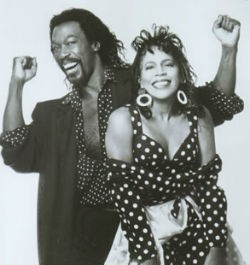Nickolas Ashford, R.I.P.
Losing a spouse is always a life-altering tragedy—but it must be particularly acute in the case of Valerie Simpson. The passing yesterday of her spouse and her singing and songwriting partner, Nickolas Ashford, at age 69 ended a five-decade series of great conversations.
I’m not speculating on their seemingly content home life after 37 years of marriage and nearly 50 years in each other’s lives. As songwriters, Ashford and Simpson weren’t just composers of indelible melodies. It’s their loquacious, street-friendly but deceptively conversational lyrics that, I’d argue, set them apart from the pack.
How proud were they of those lyrics? Enough that the music video of their biggest hit as recording artists, 1984’s “Solid,” leads off in medias res—not with the catchphrase/future Obama slogan “solid as a rock,” but with a very reflective verse lyric: “And for love’s sake/ Each mistake, you forgave/ And soon both of us/ Learned to trust.” Simpson sings these words a cappella, so you can’t ignore them. They hold back the big hook, because the lyric is sharp enough.
Again, how important were words to these two? Enough that when, in 1969, they were parachuted in to rescue Diana Ross’s foundering first album following her departure from the Supremes, they convinced Berry Gordy to let them remake their hit Marvin Gaye-Tammi Terrell single “Ain’t No Mountain High Enough” with Ross largely speak-singing the lyrics, for minutes on end.
Diana Ross, “Ain’t No Mountain High Enough”
Talk about delayed gratification: that immortal melodic hook, one of the greatest in pop history, is only alluded to until the song is three-fourths over, and it’s only fully sung by Ross as the song is about to fade out. As both the writers and producers of the track—released against Gordy’s better judgment, and ultimately Ross’s first No. 1 hit—Ashford and Simpson were remarkably brave and willing to be indirect, even when helping to sell a superstar. They trusted in their words.
Chaka Khan, “I’m Every Woman”
South Carolina native Ashford and Bronx-born Simpson wanted to be performers from the day they met in a Harlem church in 1963. Their early failures at front-line stardom may have led to their mid-’60s careers as writers, mostly for Gordy’s Motown. But it also gave them an empathic mind-meld with the other artists they supplied with songs.
Clearly Gaye and Terrell benefited from their innate sense of male-female dynamics, so amply displayed in a still-unequaled string of late ’60s vocal duets, from “Your Precious Love” to “You’re All I Need to Get By.” But even the smaller soul stars who recorded Ashford-Simpson compositions were given, not just sparkling melodies, but the ring of truth as expressed in conversation. Listen to the medium-sized 1974 hit by the Dynamic Superiors, “Shoe Shoe Shine,” which kicks off with the brilliant lines, “First of all, let’s get one thing straight/ All the things you desire/ Will have to come late.” This was lyrical dialogue of the first order, the equal of Smokey Robinson in immediacy.
The Dynamic Superiors, “Shoe Shoe Shine”
The confluence of Ashford’s death yesterday with fellow songwriter Jerry Leiber prompts inevitable comparisons between the two legendary writing duos. The Ashford & Simpson catalog might not be massive enough to warrant a whole Broadway revue a la Leiber-Stoller’s Smokey Joe’s Café, although it was lucrative enough to inspire “Bowie bonds” creator David Pullman to package them for trading in the ’90s and win the couple a big, and deserved, payday.
But where Leiber and Stoller deftly reflected, and built sonic cathedrals around, urban vernacular, Ashford and Simpson helped invent vernacular: “Destination: Anywhere,” “Ain’t Nothing Like the Real Thing,” “Ain’t No Mountain High Enough,” “I’m Every Woman.” The fact that these sounded like street-level commonplaces before Ashford and Simpson coined (or, perhaps, codified) them takes nothing away from their eloquence.
Ashford did precious little in his career without Simpson by his side. His most notable solo career achievement was coproducing the 1968 Supremes-Temptations smash “I’m Gonna Make You Love Me,” and while his wife released a few solo discs in the ’70s, he never attempted the same.
This lifelong multi-hyphenate partnership between spouses is, too, fairly unique. For all the famed male-female duos in pop songwriting—Goffin-King, Mann-Weil, Bacharach-Bayer Sager—few successfully stepped in front of the microphone at all; or, in the case of Carole King, without dropping their erstwhile partner. That Ashford’s and Simpson’s marriage survived and indeed appeared to thrive, amid the various ups and downs of a career in and out of the spotlight, must win them some kind of special prize for showbiz longevity.
Like all of the aforementioned songwriters, Ashford’s and Simpson’s body of work has become part of the fabric of the pop tapestry. Always charming but never especially cool—even when they had front-line hits in the ’70s and ’80s, Ashford & Simpson radiated warmth more than hipness&30151;they’re easy to underrate. Even when their compositions were interpolated by Method Man and Mary J. Blige in 1995or sampled by Amy Winehouse in 2006, the duo never enjoyed a postmodern revival a la Burt Bacharach.
Listening to their songs, however, one gets the sense that they didn’t much care about being cool. Nick Ashford died accomplished and loved by his soulmate, who was pretty much all he needed to get by. However sad his passing, that’s a triumph.
[SOTC homepage | Facebook | Twitter | Letters]
Content retrieved from: https://www.villagevoice.com/2011/08/23/nickolas-ashford-r-i-p/

